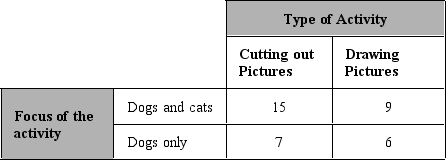Dr.Elder was interested in the way people recognize objects as members of categories.For example,what makes us recognize a dog as being a dog and not a cat? More specifically,he was curious as to whether people think about categories in a more complex way if they contemplate an "opposite" category first.For example,does a person think differently about the category of "southern" if they first think about the category of "northern"? He is also curious as to whether people categorize differently if they are exposed to category members compared with generating category members.Dr.Elder has four groups of participants (with 30 people in each group) .In Group A,participants were told to cut out pictures of dogs and cats from magazines.In Group B,participants were told to cut out pictures of just dogs from magazines.In Group C,participants were told to draw pictures of cats and dogs.In Group D,participants were told to draw pictures of just dogs.After doing this for 30 minutes,participants in all groups were asked to list the attributes that define the "dog" category.Having a higher number of attributes listed was considered to be an indication of thinking about the category in a more complex way.The results of his study are below.

-In Dr.Elder's study,how many possible main effects exist?
Definitions:
Gender Prejudice
Preconceived opinions or judgements about individuals based solely on their gender, often leading to discrimination or inequality.
Less Intelligent
A relative term indicating a lower level of cognitive ability, understanding, or acumen.
Qualified Woman
A woman who possesses the necessary qualifications, such as education, skills, and experience, for a particular job or task.
Ingroup Bias
The tendency to favor members of one's own group over those from different groups, often leading to prejudice and discrimination.
Q8: Why is there a publication bias against
Q10: Jenny reads the following headline on an
Q12: Which of the following determines the construct
Q24: Imagine that you are reading a journal
Q25: James is asked about the best way
Q39: is the approach of collecting data and
Q48: Dr. Sheffield is a clinical psychologist who
Q62: Name the three criteria/rules necessary for making
Q65: Which of the following is true of
Q66: Anton and his friends are discussing a